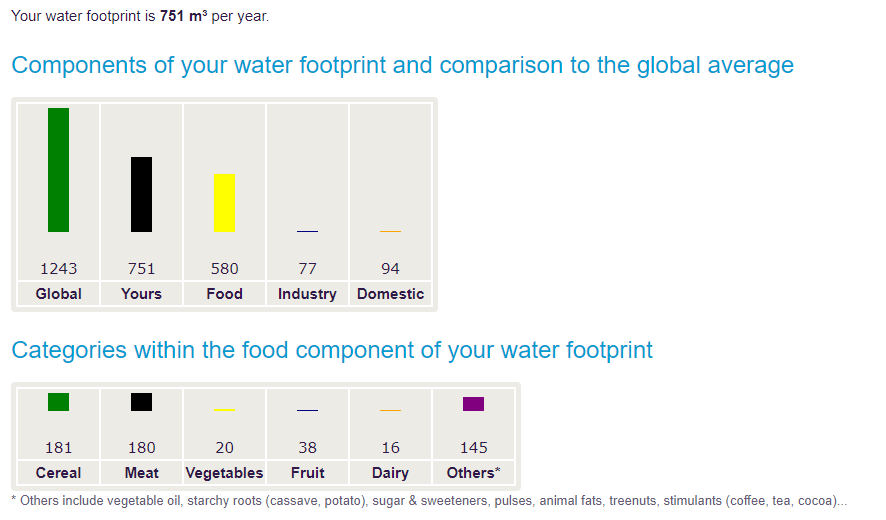Blogs
1. Ecological Footprint Calculator
The part of the footprint calculator that surprised me the most was that if everyone lived like me, we would need 4.3 Earths to survive. Especially the food category had already covered 2.2 gha of my ecological footprint. The site tells me that my ecological footprint is about 7.4 gha. Edmonton’s (city that I’m current residing in) ecological footprint was measured to be 7.67 gha per capita in 2012, with a difference of 0.27 gha from mine. South Korea’s (I’m originally from there) ecological footprint was measured to be 5.7 gha in 2012, with a difference of 1.7 gha from mine. Though Edmonton is a city and South Korea is a country, Edmonton has a much higher rate of ecological footprints, possibly because of the difference between lifestyles. While calculating my footprint, the first thing I thought was that I definitely needed to reduce the consumption of meat, especially beef. I can do this by decreasing meat consumption and increase the consumption of plants, such as vegetables. The amount of methane produced by the cows are enormous. About 70kg ~ 120kg of methane is produced per year just by the cows. Therefore, less consumption of beef (or really any kind of protein) would lower the ecological footprint. However, the amount of methane would still remain the same if only I made the difference. Everyone has to do it consistently. Reading the article posted in the link, the quote, “It's part of a larger narrative of trying to create villains; to draw lines between producers as responsible for the problem and everyone else as victims. Frankly, we're all the users and therefore we're all guilty. To create a narrative that involves corporate guilt as opposed to problem-solving is not going to solve anything." by David Victor made me nod as well. So how can an individual really make a difference? Possibly, the usage of social media such as Twitter and Facebook might help. When an individual posts their action that improves climate change, and to get others to participate in the action, gradually, change would arrive. Effective usage of hashtags is also a good idea.
2. Climate Challenge
Technological issues wouldn’t enable me to access to the simulation. The link to the WebWise Flash install guide ends up as Error 404: Not Found.
3. Water Footprint Calculator
My footprint is estimated to be roughly around 751 cubic metres a year, while the world’s average is roughly around 1243 cubic metres a year. My consumption of cereal and meat is high, with the consumption of dairy, vegetables, and fruits as very low, not even reaching 40 cubic metres for each. Just like I mentioned in question 1, I really need to decrease my consumption of meat- however, the consumption of fruits and vegetables can remain the same- or even higher, as they are a healthy choice. I wouldn’t say not much on dairy because of the methane produced by the cattle.

According to UN, South Korea is listed as ‘little or no water scarcity’, contrary to many beliefs of Koreans. (Link: http://www.un.org/waterforlifedecade/scarcity.shtml ) However, South Korea suffers from serious drought, and especially in countrysides in summer, the usage of water is often limited. Farmers often have a hard time trying to water their crops only using the limited resource. Generally, water in South Korea is controlled by the government and national water companies.
Post comment
3 Comment(s)
Julia, maybe try opening it on Chrome
The link to download it is: https://www.google.ca/chrome/browser/features.html?brand=CHBD&gclid=EAIaIQobChMIov7M39O51gIVU57ACh1hRA3SEAAYASABEgKcHPD_BwE&dclid=CPuszeHTudYCFcKrZAod_RgMxQ
Hi Julia,
I really enjoyed reading your work, and your answer to the first question is very thorough and well-developed. A question I have for you is that in the reading, it stated the top companies that are carbon producers- how do you think we should work with them and influence them into switching to renewable energy sources that would benefit both them and the environment? What laws or policies do you think could help with that?
Remember that meat is still an important part of the meal-how do you think you could limit your food consumption while still staying healthy?
Lastly, what do you think the water companies and the government can do to provide more and cleaner water for those in South Korea?
Overall, amazing response, and keep up the great work!!
Best,
Helen
Wow Julia! Thoughtful and thought-provoking!

Helen Chen
Sep 22, 2017